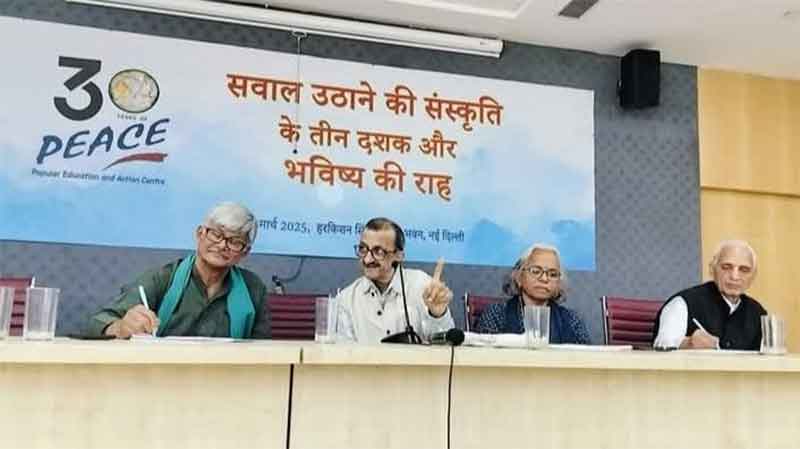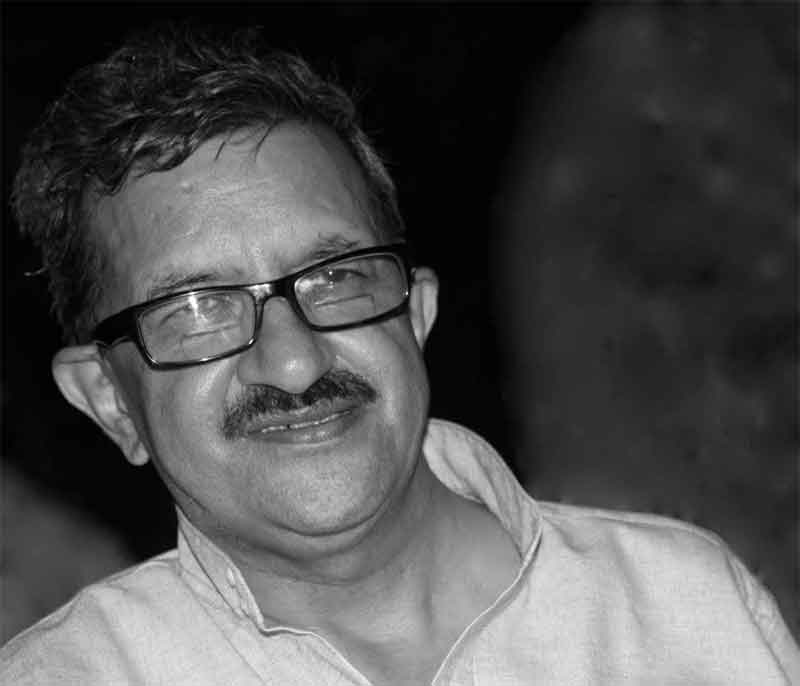When over a hundred long-time fellow travellers of PEACE gathered at HKS Surjeet Bhawan in mid-March this year, Anil Chaudhary—Anil da, as he was fondly known—sat quietly among them, listening sharply, reacting occasionally, and reminding everyone of something he believed in deeply: “Funded organisations whose main objective is to support social transformation and people’s movements—if they’re not doing that, they shouldn’t exist just for the sake of it.”
That was Anil da—firm, clear, and unsparing in his political clarity. He never sought the spotlight. He chose, instead, the long, hard road of process-building, capacity-strengthening, and nurturing leadership from the grassroots. He passed away on 14th April 2025 after long battle with cancer, and though he would have resisted any personal homage, it is impossible not to speak of the man who shaped so many of us and the political spaces we inhabit.
For many of us, the loss is personal. I was fortunate to meet him at the PEACE gathering marking its 30 years, just a few weeks ago. We had planned a breakfast meeting, but I left Delhi before it could happen. Now, it never will. Over the years, since I moved out of Delhi in early 2020, whenever I visited the city, I would make time to meet him. He was always generous—with his time, his home, and his deep, reflective insight into political processes, not only with me but with everyone. During the pandemic, when I began writing about resistance movements across the world, he was often the first to respond—encouraging me, commenting thoughtfully, and nudging me to keep going. He did this with so many of us, encouraging the younger generation and always available in PEACE library in a corner holding addas conspiring initiatives and welcoming people.

A Life Dedicated to Collective Struggle
Anil Chaudhary was a lifelong organiser, dissenter and political educator whose activism spanned over four decades starting with his early days of student activism in JNU. He remained a lifelong dissenter, got expelled from CPIM, left Centre for Science and Environment (CSE), PRIA, some of the big established structures in 80s. But remained a steadfast member of the broader Left, critically engaging with several processes, bringing thought to action and was an epitome of unconditional support and solidarity to innumerable initiatives – big or small, local or national. An independent left outside of political Party factionalism was a dream and always a part of his ideological frame, somethings which guided his associations with many autonomous processes. To name a few, Coalition of Nuclear Disarmament and Peace, Aman Ekta Manch, Delhi Solidarity Group, Sangharsh, the People’s Council for Shrinking Democratic Spaces (PCSDS), Jan Adhikar Andolan, Nation for Farmers, Bhumi Adhikar Andolan, and so many other processes and movements, the list is too long to be counted. He was instrumental in creating a space which became the harbinger for so many campaigns around toxic waste, nuclear waste, UID, neo-liberal attack on education, rights defenders and so on were launched over the years. He remained committed to the ethics of solidarity, self-reflection, and critical engagement, which he would often refer as sawaliya sanskriti. He disagreed politically—often, sharply—but never disengaged and that’s the reason that when needed he became part of so many processes where Left parties played a crucial role. His belief that differences are not divisions was rooted in a deep democratic sensibility.
In 1995, he founded the Popular Education and Action Centre (PEACE)—not as just another NGO, but as a capacity-building organisation committed to popular education. PEACE was built on the belief that education could be a transformative tool—especially for the oppressed and marginalised. It sought to enable people to critically examine the structures affecting their lives, and to engage with the world in ways that disrupted the status quo. In that, he found the Marxist framework and used Marx, Lenin and Mao to his own interpretation of South Asian reality.
PEACE became known for advancing the philosophy of Sawaliya Sanskriti—the culture of questioning. Anil da strongly believed that questioning, especially by the marginalised, is a radical political act. It is through questioning that we begin to peel away the “constructed realities” that hide injustice, as Paulo Freire taught us, and begin to build political consciousness rooted in lived experience.
Participants in PEACE’s training programmes came from field-based social action groups across India—organising on land, forest, water, displacement, and social rights. The pedagogy focused on creating safe, supportive, democratic spaces where learners could engage in dialogue, return to their communities to apply what they’d learned, and come back with reflections. The learning was cyclical, political, and rooted in the movements participants belonged to. In the words of PEACE, “Those who own the issue must own the struggle. Those who own the struggle must lead it.” That principle guided Anil da’s life and work.
Importantly, PEACE did not engage in direct community action. Instead, it saw itself as a supporter of social movements, offering tools, reflection, and training. Anil da insisted that organisations should never replace or co-opt people’s struggles. “The issue belongs to the people. So must the leadership,” he would often say.
His pedagogy was steeped in the Freirean idea of critical consciousness—that social change begins with people becoming aware of the hidden structures of power that shape their lives. And for Anil da, power was not abstract. It lived in relationships: between citizen and state, between the landless and landowner, between men and women, between adults and children, even between human beings and nature. He believed that when individuals begin to ask critical questions about these relationships, they begin to reclaim their agency.
A Political Thinker and Movement Builder
Anil da’s understanding of Indian civil society was deeply historical and nuanced. He often spoke about the shift from community-based voluntary efforts in the post-Independence years to the increasingly professionalised, bureaucratised, and externally funded NGO sector 90s onwards. He worried that this shift was disconnecting civil society from grassroots movements and democratic politics. He was wary of external influences, including large donors, and remained deeply critical of organisations that lost sight of their political purpose in the pursuit of funding or recognition. He was perhaps one of the best analysts around on the transformation of feudalism in the context of South Asia and how 90s shaped India in a much perverse way for which he never shied away from attacking Congress. Pre or post 2014, he never missed an opportunity to attack the fundamentals of the Congress politics in Indian history, which to him was not only represented by the dual mix of Nehruvian and Gandhian frameworks, but also had abandoned the framework of welfare, social democracy and equality which paved the way for the communal and neo-liberal politics of BJP.
His brief association Voluntary Action Network India (VANI) in the 1990s was aimed at articulating a collective identity for India’s voluntary sector, from which he moved on once differences developed, leading to founding of PEACE. He also played an important role in INSAF (Indian Social Action Forum), which brought together over 750 organisations across the country on issues of displacement, environmental justice, and civil liberties. Later, he was among the key figures behind the Coalition for Nuclear Disarmament and Peace (CNDP), which emerged after India’s Pokhran nuclear tests in 1998 or formation of Aman Ekta Manch after 2002 riots.
In recent years when several NGOs and civil organisations faced scrutiny or several critical voices lost their FCRA—he stood his ground. He defended several CSOs with which he was associated as transparent, legally sound, and rooted in the Constitutional values. What troubled him was not just the attack on NGOs, but the shrinking of democratic space and the erosion of critical public discourse. He was never to backdown from any challenge and continued to come up with campaigns and extended support to processes, be it the People’s Council for Shrinking Democratic Spaces (PCSDS) or Committee Against Assault on Journalists (CAAJ).
A Legacy of Thoughtfulness and Trust
Anil da’s strength lay in how he engaged—with movements, with people, with ideas. He had the rare ability to be both deeply political and profoundly kind. He could critique you and support you in the same breath. He made time for everyone, whether you were a young intern just finding your way or a seasoned activist navigating difficult terrain.
He also left behind a political culture—of mutual respect, long-term commitment, and thoughtful disagreement. He reminded us that organisations must serve people, not the other way around. That we are here to strengthen movements, not build careers. That leadership is about trust, not authority.
In recent years, when his ability to travel was limited, he remained a constant presence in our lives through forwarded essays, long emails, and thought-provoking messages. These were not just information dumps; they were ways of continuing the political dialogue, of nudging us to reflect more deeply, act more thoughtfully, and remain grounded.
It is hard to say goodbye to someone who was so much a part of our collective journey. He would have refused a grand farewell. But this much must be said: he mentored us, challenged us, supported us, and changed us. In ways big and small, he helped shape the Indian civil society landscape—not from the stage, but from behind the scenes.
For Anil da, process was always more important than recognition. And yet, in choosing the process, he left behind something far more lasting than fame: he left behind a political culture that continues to thrive in collectives, organisations, and individuals across the country.
Rest in power, comrade. You will be deeply missed.
But your ideas, your questions, and your example will continue to guide us.
Madhuresh Kumar is a former National Convener of National Alliance of People’s Movements (NAPM India)
Courtesy: CounterCurrents

